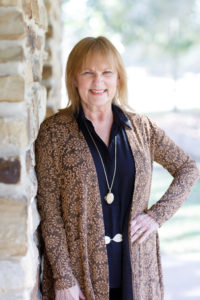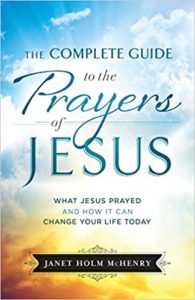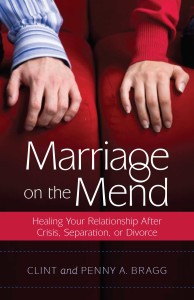 When our world is rocked with crisis and we cry out to God, what do we do when the answer we seem to get from Him is not what we want to hear? How do we respond when God says “no?”
When our world is rocked with crisis and we cry out to God, what do we do when the answer we seem to get from Him is not what we want to hear? How do we respond when God says “no?”
Award winning author and speaker Janet McHenry has an answer for us, and I asked her to share with us her answers to this question. For in her new book, The Complete Guide to the Prayers of Jesus: What Jesus Prayed and How It Will Change Your Life Today, she tells us how the very prayers that Jesus prayed can teach us how to respond when we hear that disappointing “no.”
So I’m going to turn “Heart Talk” over to Janet today. If you leave a comment for Janet, I will enter your name in a drawing for her new book, The Complete Guide to the Prayers of Jesus, published by Bethany House.
When God Says “No”
by Janet McHenry
One of the toughest things to handle as a Christian is how to respond when God says “No.”
We know that every prayer for healing is not answered.
Every prayer to be saved from bankruptcy is not answered.
Every prayer to save a marriage is not answered.
So . . . what are we to believe about prayer in those contexts? And what are we to believe about God?
After all, didn’t God say in Jeremiah 33:3, “Call to me and I will answer you”?
In Psalm 37:4 God says, “Delight yourself in the Lord and he will give you the desires of your heart.”
And Jesus said, “I tell you the truth, my Father will give you whatever you ask in my name. Until now you have not asked for anything in my name. Ask and you will receive, and your joy will be complete” (John 16:23-24).
Yes, God answers all prayers in some way. Pastor and author Rick Warren has said, “God answers every single prayer. Now, he doesn’t answer them the way you’d like it every time, but it’s an answer. ‘No” is an answer. ‘Wait” is an answer. ‘Grow up’ is an answer. ‘In a little while’ is an answer. ‘In my way’ is an answer. God never leaves a prayer unanswered.”
So, okay, technically the answer was “no” . . . there was an answer, but how do we reconcile that no answer with the earlier scripture promises about fulfilling our heart’s desires and such? And then how do we as Christians respond?
Because I always turn to Jesus as my prayer mentor, I searched how he responded when the Father said “no” to him.
Jesus prayed what I called the two-sided coin prayer in one of my books many years ago: “Abba, Father, everything is possible for you. Take this cup from me. Yet not what I will, but what you will.”
On the one side of the coin: “Take this cup from me.”
On the other side of the coin: “Yet not what I will, but what you will.”
So, Jesus laid out his heart’s desire . . . and his Abba, his Father, said “no” . .  . and Jesus headed to the Cross.
. and Jesus headed to the Cross.
The next three of Jesus’s prayers, I believe, spell out how we can respond as Christians when we don’t see our prayers answered the way we’d like. These are the last three of Jesus’s ten prayers that we have—and all of them he said as he was hanging on the Cross.
Forgive
The first of those three prayers is “Father, forgive them, for they do not know what they are doing” (Luke 23:34). So the first thing we can do is forgive.
Jesus was forgiving the soldiers who had nailed him to the Cross, but perhaps he also was forgiving Pontius Pilate and the Jewish officials and even Peter, who had denied him, and the rest of the disciples, who had vanished.
Years ago my rancher husband had seven cattle that died in a two-day blizzard. Six calves and an old bull had bedded down in a dry creek bed and gotten covered over. Despite those conditions, Craig was convicted of six felony animal abuse charges four years later. Because the judge refused to allow our key witness to testify—a UC Davis vet professor, the chief expert in the West on cattle—and refused to have a lot of important evidence admitted, we won a reversal in the California Court of Appeals, but we had a lot of forgiving to do. That case took six years out of our lives, as well as a lot of financial resources. But forgiveness isn’t about what we deserve; it’s kingdom work, and it’s what Jesus did, so we do it in obedience.
Lament
The second thing we can do when God says “no” is lament. Lament means to cry out mournfully. And Jesus’s second prayer continues to give us insight about how to respond: “My God, my God, why have you forsaken me?” (Matt. 27:45-46).
Yes, go ahead and cry it out. God can take it. Not complain. But cry out in your pain.
This prayer above all others addresses the biggest, most-often asked question mankind has about God. WHY? Why does God allow suffering? Why must we fall into the hellholes of life? If God loves us so much, wouldn’t such a loving Father steer us around the intersections of pain? Couldn’t there be a better way?
Jesus used the word “forsaken.” He was deserted, dumped, abandoned . . . at least he humanly felt that way. But his being abandoned led to our being adopted. Just as an abandoned baby left at a church or a firehouse might be adopted by a young couple that had been praying for years, Jesus’ abandonment, led to our adoption.
It’s true that we might not always see the purpose in our suffering. We may never. Yes, life isn’t fair. And sometimes the WHY? question gets stuck in our hearts. It hurts. But we can control how we respond. We can use our pain for others’ good, if we stop, look around, see others who are suffering in similar ways, and reach out to them to encourage and support them. We do not have to stay in that place of feeling forsaken. We can take practical steps to use our hurt to help others.
Submit
In Jesus’s third prayer from the cross, we learn to submit. Scripture tells us “It was now about the sixth hour, and darkness came over the whole land until the ninth hour, for the sun stopped shining. And the curtain of the temple was torn in two. Jesus called out with a loud voice, ‘Father, into your hands I commit my spirit.’ And when he said this, he breathed his last” (Luke 23:44-46.
“Into your hands.” Wow, that could seem like a scary prayer, except that when we commit or submit ourselves to our heavenly Father fully, we are giving ourselves to the God who redeemed us, the One who adopted us, the one who loves us.
I know such relinquishment, because I saw this through my dad. Six months after he began noticing that he was having a hard time gripping a golf club anymore, he was diagnosed with amyotrophic lateral sclerosis—ALS—which destroys the nerve endings to the muscles until eventually the person cannot move, cannot breathe, cannot count on a heartbeat.
Although the doctors said he would have two to four years, he died five months after diagnosis. However, he not only showed other people how to live with faith; he showed others how to die with faith.
My dad had a quick wit, always turning a phrase and telling jokes. Even in his last hours he was still joking with those around him. The day before he passed away, he was still able to push the call button, so he called for the nurse, who came in and said, “Did you call me, Bob?”
He smiled and said, “Why would I call you Bob? Your name is Mary.”
You see, people, the world doesn’t need to see Christians living out their faith in prosperity and posting all the happy stuff on Facebook. They need to see us facing struggles with dignity, with faith, and with integrity. They need to see us thanking God despite our pain and struggles. They need to see us real and vulnerable, yes . . . but in a looking-up posture that shows that FAITH WORKS: that God is real in our lives, that he is worthy of our trust, and that it is our faith alone that sustains us in the Dark Night of the Soul.
Jesus’ prayers teach us how to respond when God says “no”: forgive,  lament, and submit. But they show us something even more important: the ONE THING we need to remember about prayer. God himself is the bigger reason for prayer. He wants us to bring our needs before him. He wants us to offer praise and thanksgiving and confession, but even more than that, HE himself is the bigger reason for prayer. He wants us to develop our relationship with him, to be a bigger part of our daily, moment-by-moment life, drawing closer to him and learning more about his good character.
lament, and submit. But they show us something even more important: the ONE THING we need to remember about prayer. God himself is the bigger reason for prayer. He wants us to bring our needs before him. He wants us to offer praise and thanksgiving and confession, but even more than that, HE himself is the bigger reason for prayer. He wants us to develop our relationship with him, to be a bigger part of our daily, moment-by-moment life, drawing closer to him and learning more about his good character.
Prayer is not about finding pockets of time to say a few remote-controlled phrases. Prayer is about relationship—becoming closer to the One who created you and loves you, so that when God says “no,” you simply nod your head and know he still loves you, he is still in control, and he will walk you through the valley you’re in.
If you’d like a chance to receive a free copy of The Complete Guide to the Prayers of Jesus: What Jesus Prayed and How It will Change Your Life Today, please leave a comment below.
* * *
Janet McHenry is an award-winning speaker and the author of 24 books, including the best-selling PrayerWalk and her newest, The Complete Guide to the Prayers of Jesus: What Jesus Prayed and How It Will Change Your Life Today. You can see more about Janet, her speaking ministry, and her books at www.janetmchenry.com.














